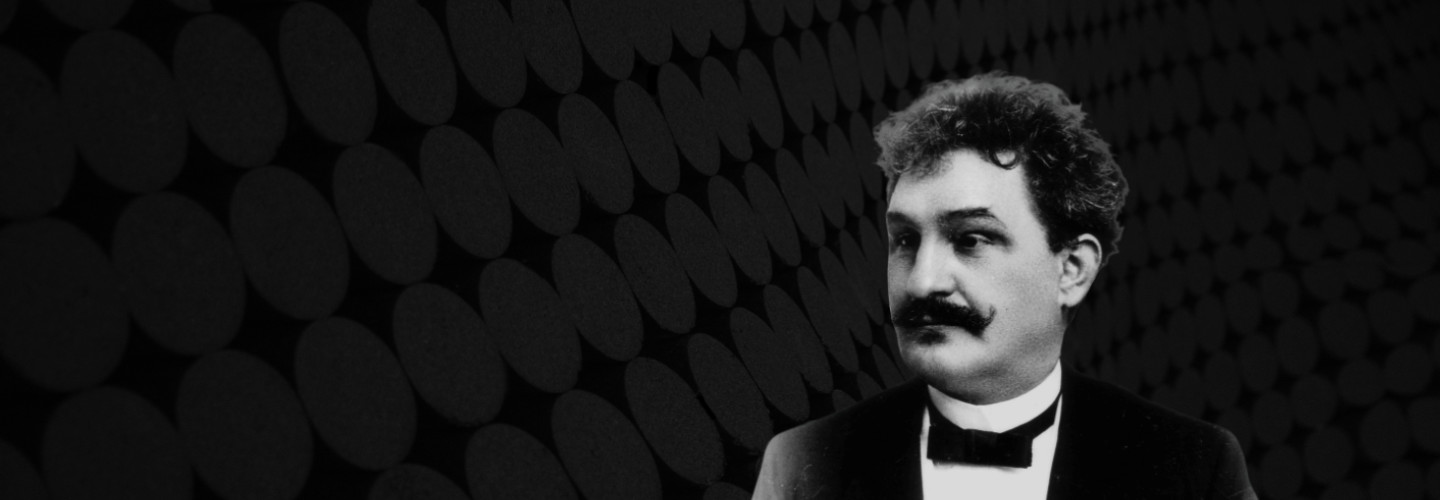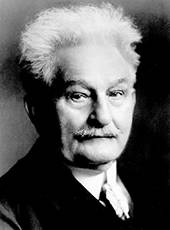

Leoš Janáček
*3 July 1854
†12 August 1928
Works by Leoš Janáček
Biography
1854 – Leoš Janáček is born on 3rd July in Hukvaldy, Moravia.
1869 – Finishes school and begins to attend the Brno Teacher Training Institute.
1872 – Begins teaching, and becomes the choirmaster at the monastery where he was a chorister.
1874 – Becomes a fully qualified teacher and attends the Prague Organ School.
1877 – First piece, Exaudi, choral piece for mixed voices published.
1881 – Marries Zdenka Schulzová and is appointed the founding director of the Brno Organ School.
1882 – Daughter, Olga, born but soon afterwards separates from his wife. Begins teaching at Brno Beseda, and at the Organ School.
1884 – Janáček returns to his wife. Hudební listy is founded, in which, many of Janáček’s writings and reviews are published. Czech theatre opens in Brno.
1886 – Begins teaching at Old Gymnasium in Brno where František Bartoš (the philologist who later constructed the collections of folk songs with Janáček).
1887 – Composes his first opera Šárka and sends the manuscript to Antonín Dvořák for his comments, but the rights for the libretto are refused by its author, Július Zeyer.
1888 – Second version of Šárka written after Dvořák’s recommendations. Last volume of journal Hudební listy published. Begins collecting folk songs with Bartoš. Son Vladimír is born.
1890 – Janáček’s son dies. Premiere of Gabriela Preissová’s play Her Stepdaughter.
1891 – Počátek románu composed, including adaptation into a suite.
1894 – Premiere of Počátek románu in Brno, begins to plan Jenůfa, and writes the original ‘Jealousy’ prelude.
1902 – Janáček’s daughter, Olga, is mortally ill. Completes Act Two of Jenůfa in the summer.
1903 – Olga dies in February. Jenůfa is completed and dedicated to her memory. Sees Charpentier’s Louise, which remains a lasting inspiration to his later works. Jenůfa is submitted to the Brno theatre, where it is accepted for performance. Starts plans for Osud.
1904 – First performances of Jenůfa in Brno. Has plans to write another Preissová opera (based on The Farm Mistress) but instead continues with work on Osud.
1905 – Osud first version completed.
1906 – Revises the opera and submits it for consideration at the Brno theatre.
1907 – Sketches are made for a new opera on the subject of Anna Karenina. Submits Osud for performance at the new Czech theatre in Prague, and makes further revisions. Jenůfa also undergoes revisions.
1908 – Jenůfa published in vocal score. The Excursions of Mr Brouček to the Moon begun.
1910–1911 – Further work on the Brouček opera, which he completes in two act for in 1917.
1915–1916 – Kovařovic accepts Jenůfa for performance in Prague (performed in 1916 in Kovařovic’s version of the score to great success). Completes the final version of Brouček and begins the Epilogue.
1917 – Has affair with Gabriela Horvátová, the Kostelníčka in the Prague Jenůfa. Has out-of-court divorce from his wife. Epilogue of Brouček opera is completed. Jenůfa published. Meets Kamila Stösslová in Luhačovice and begins The Diary of One who Disappeared.
1918 – Jenůfa premiered in Vienna. Abandons epilogue to Brouček, which is then accepted for Prague, later published. Czechoslovakia becomes independent.
1919 – Revises Šárka (which he finds again in a trunk) and completes The Diary. Sees a performance of Puccini’s Butterfly that is the impetus for composing an opera of Ostrovsky’s The Storm, which becomes Katja Kabanowa.
1920 – Brouček performed in Prague.
1921 Completes Katja, which is premiered in Brno. Buys holiday cottage in Hukvaldy, the village in which he was born.
1923 – Completes The Cunning Little Vixen and begins his next opera The Makropoulos Case.
1924 – World premiere of Vixen in Brno, and Berlin premiere of Jenůfa.
1925 – Vixen given in Prague. Šárka given for the first time in Brno. The Makropoulos Case is completed.
1926 – Brno premiere of Brouček, followed by the publication and premiere of Makropoulos in Brno. Katja premiered in Berlin.
1927 – Begins his final opera From the House of the Dead. From his visit to Písek in April Janáček writes to Kamila Stösslová more or less every day until his death. Interludes to Katja are extended to suit staging requirements.
1928 – The Makropoulos Case premiered in Prague. From the House of the Dead is completed.
Leoš Janáček catches a chill during Stösslová’s trip to Hukvaldy and dies from pneumonia in Ostrava on the 12th August.
About the music
Read Max Brod's obituary of Leoš Janáček.
Born in 1854 in North-Eastern Moravia, Leoš Janáček had an extraordinary life, marked by tragedies in his family, inspired in his late work by his love for a married woman and encouraged by success which did not come his way until his sixties.
He lost both his children: his son Vladimír at the age of two and his daughter Olga at twenty-one. His wife Zdenka tried to kill herself.
At 63, Janáček met Kamila Stösslová, a married woman and mother of two children, several decades younger than himself, and fell in love with her. It was an emotional upheaval which found expression in a range of mature works as well as in 650 letters. In one of them Janáček confessed:
„In my compositions warmed by pure sentiment, honesty, the search for truth, you are there, my tender melodies come from you, you are the gypsy woman with child in The Diary of the One Who Disappeared, you are the poor Elinor Makropulos, and you are that likeable boy Alej in From the House of the Dead. If the thread that binds me to you were to break, it would also break the thread of my life” (8 August 1927).
Janáček was fifty when the opera Jenůfa, on which he had worked for ten years, was premiered – in Brünn, in the provinces. He had to accept that the opera would only be produced in the capital, if he allowed the score to be revised by the Director of the National Theatre, Karel Kovařovic. A humiliation for the 61-year-old composer who realised the extraordinary significance of a performance in Prague.
Dr Emil Hertzka, Director of Universal Edition, heard Jenůfa there and was so impressed that he decided there and then to publish the opera. That is how it came to the first contract between the composer and UE, in 1916.
The composer Josef Suk urged the Prague writer Max Brod to go and see the opera. In a short note entitled My First Encounter with Janáček, Brod – whose German versions of Janáček’s libretti were to pave the way for the composer’s international success – describes the music’s effect on him:
“The tickets were all sold out, it was with difficulty that I found a place on the highest gallery where I could hear the music without seeing the stage. Suddenly, there rose to my ears the ancient sounds of a soldier’s song, of a peasant dance. Tears of happiness, tears that I had long missed, came to my eyes… Oh, it was again simple and good to be in this world!”
“I reported on this extraordinary work for the Schaubühne, Siegfried Jacobsohn’s magazine in Berlin, under the title Czech Operatic Bliss. After the appearance of this jubilating article, I received a letter from the composer to thank me. We had not met before but now he wanted to visit me. ...Some time later, an old gentleman I had never seen before was standing in my room. It was on a Sunday, rather early in the morning. I had been fast asleep. Was I still dreaming? That head with the high, beautifully shaped forehead, the flashing-serious look in the large, open eyes, the finely curved lips: that is Goethe’s head as painted by Stieler, but transposed into a softer, Slav version… A name rings in my dream: Leoš Janáček. He is the composer of Jenůfa.
Max Brod had creative plans of his own, he wanted to write some dramas and was disinclined to translate the libretto into German. However, he had no choice but to say yes:
“There came the Master himself to see me, he did not balk at the long trip from Brünn to Prague. The look in his eyes defeated any resistance I may have had. Even more compelling was his naive request – he did not beat about the bush but made his point energetically. He told me how he had taken the night train from Brünn to Prague and added: “Now I have been walking in front of your house up and down since six o’clock and have been thinking all the time: ‘This Brod has written beautifully about me. If he is willing to do the translation, all will be well. Should he turn me down, all will be lost.’”
Janáček was right. It was thanks to Max Brod’s German version of the libretto – and those of the other operas – that Jenůfa embarked on an unprecedentedly successful international career, as did the operas Janáček composed in the subsequent years. The Viennese premiere of Jenůfa was a triumph and soon enough Universal Edition was inundated with orders for the performing material from Bern, Graz, Dortmund, Heidelberg, Kassel, Lübeck, Hannover, Stuttgart, Munich, Mainz and other cities.
Extraordinarily enough, most of Janáček’s masterpieces (the operas Katja Kabanova, The Excursions of Mr Brouček, The Makropulos Case, The Cunning Little Vixen and From the House of the Dead) as well as his major concert works like the Sinfonietta and the Glagolitic Mass were all composed in his last years, between 1920 and 1928.
Recognition of Janáček’s significance went hand in hand with the realisation that, beyond being a Czech composer equal to his fellow countrymen Smetana and Dvořák, he was also one of the greatest opera composers of the 20th century.
